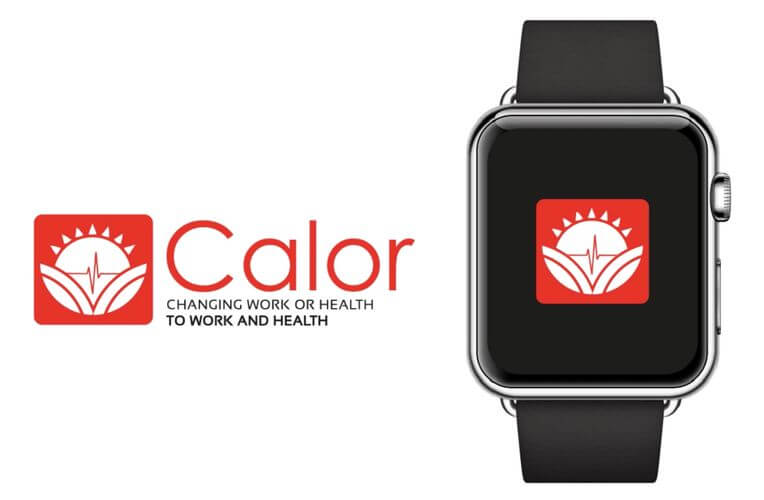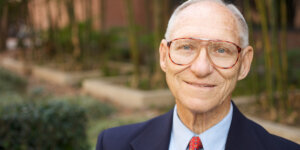
The team behind the Calor app visits Central Valley (from center, clockwise) Faith Florez, Juan Andrade, Vahagen Sinanian, Basir Navab, Akshay Aggarwal, Viraj Sahai and Shobhit Agarwal Photo Courtesy Faith Florez
Amid oak shaded country roads and stands overflowing with peaches, plums, apricots and tomatoes, California’s Central Valley also provides a searing portrait of the migrant farm worker. Temperatures can reach triple-digit sizzlers here, enough to cause second-degree burns for anyone walking barefoot across a parking lot.
Human beings aren’t built to spend long periods of time in temperatures that top the body’s own approximate 98.6 degrees. Yet farmworkers often toil for ten or more hours a day in this summer oven. At least four U.S. farmworkers die from heat annually – 20 times the rate in all non-military employees, according to the Centers for Disease Control and Prevention.
“We’re going to break the cycle” is the hope of a team of students at the USC Viterbi Department of Computer Science who developed an app that can literally save lives. It’s called Calor – “heat” in Spanish – and it was originally designed to send automatic heat warnings to farmworkers in the fields. But now it does so much more.
“It was so sophisticated and so well put together. Surely, I thought, there’s a brilliant team behind the project.”
Akshay Aggarwal
The app was developed in CS 577A “Software Engineering Real Client Team Project,” taught by legendary computer scientist, Barry Boehm who holds the TRW Professorship in Engineering. The course is exactly what it says on the label – a real life software development project involving real life clients. After students are split into teams of six, they choose an idea from a list of projects in need of code and are given a year to develop and launch.
Supannika Koolmanojwong Mobasser, a researcher at the USC Center for Systems and Software Engineering, advised the team and said that the client approached her software engineering class after several unsuccessful development attempts from multiple software companies.
“With 90,000 farms in California, Calor’s main motivation is to change from “work or health” to “work and health,” said Koolmanojwong Mobasser.
Her student, Akshay Aggarwal, said the Calor proposal immediately jumped at him because it brought together social impact and cutting-edge technologies with a clear path to delivery.
“It was so sophisticated and so well put together,” he said. “Surely, I thought, there’s a brilliant team behind the project.”
When the graduate students eventually met their brilliant client, they were surprised to find that it was one teenager, Faith Florez, a senior at La Cañada High School.
Florez spent part of her childhood in Shafter, California, a small farm town without a hospital, where she witnessed firsthand the plight of migrant farm workers. But the inspiration for Calor came from somewhere deeper.
“My great-grandmother was a farmworker,” she said. “Back then, they sprayed pesticides over the fields and wouldn’t alert the workers.” Her great-grandmother, Estella Florez, eventually developed pancreatic cancer related to overexposure to pesticides and died before her 73rd birthday.
The Florez family tree is dotted with farmworkers who came from Mexico to the Central Valley to harvest and to dream of better lives for their children. Faith’s father, Dean Florez, eventually broke away from the family tradition.
“My dad decided he wanted to go to college. A lot of people didn’t even graduate high school,” Florez said.
Dean Florez spent two years at Bakersfield College before he transferred to UCLA and from there, to Harvard. He later became a California state assemblyman and state senator, representing the Central Valley and fighting on behalf of his constituents for overtime pay and reducing pollutants.

The Calor app development team leads a group discussion with farmworkers from Fabbri Farms. Photo courtesy Faith Florez
While they were prototyping, Florez and the USC software development team went out into the grapevines at Fabbri Farms in Central Valley to come face to face with farmworkers and their work, and to ask for their direct input.
It isn’t simply the extreme temperatures, the team discovered. Heat sickness is a symptom of an agricultural system where laborers can’t speak up against unsafe field conditions, in part because many are undocumented. Some of the challenges the team faced were lack of good data services in farms, which makes it difficult to get accurate location for fetching and delivering weather information; keeping the data usage as low as possible for farmworkers who don’t have data plans; and protecting the anonymity of farmworkers through an SMS-based registration system.
“We wanted to tailor the app to their specific needs without overburdening the problem,” Florez said.
In addition to the heat warnings, they added an educational component to the app that delivers rich media content in English and Spanish to inform farmworkers about their rights and how to safeguard their health. Calor also gives farmworkers access to 911 and a direct hotline to the California Division of Occupational Safety and Health, Cal/OSHA.
Fabbri Farms owner, Jeff Fabbri said he hopes to implement the app in the field as soon as possible. “We hope that this technology can evolve to help us deal with other types of safety issues we deal with in the field,” Fabbri said. When asked about its cost-effectiveness, Fabbri said: “I believe growers will reap the benefits of this technology. We can save lives, we can save on claims. Safety pays!”
 Moving forward, the team has launched a crowdfunding campaign to raise $60,000 to jumpstart the pilot program and move the app to a wearable device such as the Apple Watch.
Moving forward, the team has launched a crowdfunding campaign to raise $60,000 to jumpstart the pilot program and move the app to a wearable device such as the Apple Watch.
“We have all the features we need, it may be the method of delivery that we need to focus on,” said Aggarwal who graduated in December 2017 with an M.S. in computer science and has now joined Apple’s Siri team.
Florez continues to champion the work while she works on college applications.
“For now, I intend to be an English major,” she said. “I’m also applying to USC.”
Hint, hint…
Published on December 14th, 2017
Last updated on April 8th, 2021











